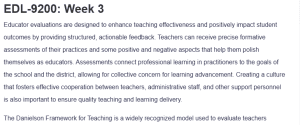EDL-9200: Week 3
Educator evaluations are designed to enhance teaching effectiveness and positively impact student outcomes by providing structured, actionable feedback. Teachers can receive precise formative assessments of their practices and some positive and negative aspects that help them polish themselves as educators. Assessments connect professional learning in practitioners to the goals of the school and the district, allowing for collective concern for learning advancement. Creating a culture that fosters effective cooperation between teachers, administrative staff, and other support personnel is also important to ensure quality teaching and learning delivery.
The Danielson Framework for Teaching is a widely recognized model used to evaluate teachers across four key domains: planning and preparation, classroom environment, instruction, and professional responsibilities (Goss, 2024). Each domain gives educators a clear picture of effective teaching practices and sets a path for professional growth. This framework encourages teacher reflection and supports formative and summative assessments, allowing educators to understand and strive for high-quality instruction consistently. Conversely, the Marzano Teacher Evaluation Model offers a research-based approach to instructional strategies linked to student achievement (Fox, 2021). This model emphasizes goal setting, feedback, and progress tracking, all geared toward fostering effective teaching practices with measurable impact. It enables teachers and evaluators to engage in an ongoing dialogue about performance, helping teachers refine practices that directly enhance student learning outcomes.
School leaders can enhance the use of educator evaluations by enriching the evaluation process with ideas from professional learning. Another approach is reconciling the professional development needs of the teachers derived from the evaluation studies to continually provide teachers with professional development in the areas of their deficient training. Another worthwhile approach is setting up mentorship and coaching programs for teachers and providing guidelines to help them based on their evaluation results.
References
Fox, D. S. (2021). Assessing the Marzano causal teacher evaluation system on K-12 student performance in New Jersey (Doctoral dissertation, Grand Canyon University).
Goss, S. (2024). The Danielson framework for teacher evaluation and student assessment. In Authentic Secondary Art Assessment (pp. 69-72). Routledge.
ORDER A PLAGIARISM-FREE PAPER HERE
We’ll write everything from scratch
Question
As a principal with well-known positive faculty-administration relationships, you have been asked by your state’s education department to present key aspects of educator evaluations at an upcoming state conference for school leaders. Discuss the following points below:

EDL-9200: Week 3
- What is the purpose of educator evaluations?
- Review at least two different evaluation models.
- Highlight strategies school leaders can use to integrate professional learning into the educator evaluation process.
Length: 1 page

